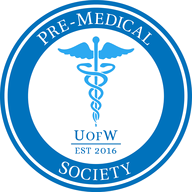
MCAT Sections

For information about COVID-19 changes to the MCAT, visit the AAMC website.
Biological and Biochemical Foundations:
BIOLOGY
This section covers cells and molecules within single and multicellular organisms, structure/growth/physiology/genetics of viruses and prokaryotes, cell division, differentiation, and specialization, nervous, endocrine, and other major organ systems.
BIOCHEMISTRY
Transmission of genetic info from genes to proteins, transmission of heritable information across generations and genetic diversity, principles of bioenergetics/molecule metabolism, knowledge of macromolecules and their monomers
Visit this link for details!
* Length may vary due to COVID-19
What is the breakdown of this section?
Breakdown
Length
95 minutes, 59 questions
10 passages
44 passage-based questions, 15 discrete questions
Courses to Take:
Biology:
Cellular Biology (BIOL-1101)
Biological Diversity (BIOL-1111)
Human Physiology I (BIOL-2040) and II (BIOL-2050)
Genetics (BIOL-2111)
Molecular Biology (BIOL-2131)
Microbiology (BIOL-2070)
Biochemistry:
General Chemistry I (CHEM-1100) and II (CHEM-1110)
Introductory Organic Chemistry (CHEM-2300)
Organic Chemistry of Biomolecules (BIOC-2010)

Chemical and Physical Foundations
PHYSICS
This section covers motion, work, forces, energy, and equilibrium, fluids for blood circulation, gas movement, and gas exchange. Electrochemistry and circuits, how light and sound interact with matter, atoms, nuclear decay, and atomic chemical behaviour.
CHEMISTRY
Water, solutions, intermolecular interactions, separation and purification methods, biologically relevant molecules, and thermodynamics and kinetics.
Visit this link for details!
* Length may vary due to COVID-19
What is the breakdown of this section?
Breakdown
Length:
95 minutes, 59 questions
Combination of passage based and discrete
Courses to take:
General Chemistry I (CHEM-1100) and II (CHEM-1110)
Introductory Physics I (PHYS-1400) or Physics for Life Sciences (PHYS-1300)
Introductory Organic Chemistry (CHEM-2300)
Organic Chemistry of Biomolecules (BIOC-2010)

Psychological, Social, and Biological Foundations
Biological, sociocultural, and biological factors that affect the way people think, perceive, and react, factors influencing behaviour change, the way we think about and interact with ourselves and others, cultural and social differences that influence well-being, social stratification and access to resources that affect well-being.
* Length may vary due to COVID-19
What is the breakdown of this section?
Breakdown
Length:
95 minutes, 59 questions
10 passages
44 passage-based questions, 10 discrete questions
Courses to Take:
Intro Psychology as a Behavioural Science (PSYC-1150)
Intro Psychology as a Social Science (PSYC-1160)

CARS
Critical analysis and reasoning skills, this section tests relationships between closely related concepts, analyze scientific explanations, understand scientific research and reason about ethical issues, and patterns/conclusions from data.
Visit this link for more details!
Length may vary due to COVID-19
What is the breakdown of this section?
Breakdown
Foundations of Comprehension: understand basic components of the text/main idea
Reasoning Within the Text: infer something from the passage with evidence, unstated conclusions
Reasoning Beyond the Text: introduced to new information and asked how it related to the text
Length:
90 minutes
53 questions (all passage-based)
Courses to Take:
*these courses are not necessary but helpful
Healthcare Ethics (GART-2040)
Intro to Economics I (ECON-1100)
Effective Writing (GART-1500)

MCAT Resources
Study resources
The Association of American Medical Colleges (AAMC) endorses the Khan Academy MCAT Test Prep videos and practice quizzes linked below which provide you with practice topics from each section of the MCAT:
The Critical Analysis and Reasoning section of the MCAT is arguably the most convoluted section on the exam. Starting to prepare for CARS early on in your studies is very important. Start today with a daily passage offered for free by JackWestin who simulates AAMC CARS logic and readings:
The AAMC MCAT Prep Hub is where you can access MCAT practice materials, such as AAMC practice MCAT tests and Section QBanks, and will be the most representative resource of the actual exam :
UWorld has a long standing reputation with many medical students and MCAT takers. This resource offers MCAT representative passages accompanied with highly detailed explanations and diagrams that will prepare you well for the real deal. Why not try it out with their FREE 7-day trial that can be found here:
For more tips and information about the MCAT, visit our Instagram “MCAT Mondays” highlight!





